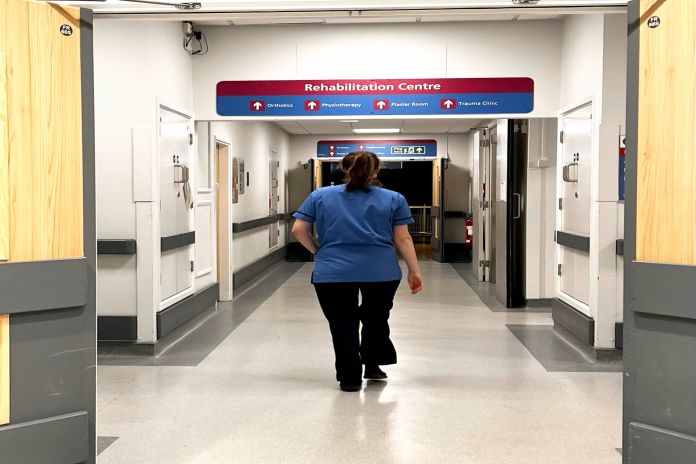“I want to make the world safer for my daughter, who is 15, so when she enters the workplace in a few years’ time, we will know she will feel safer. It is important for me that she feels we’ve done something meaningful to address and combat gender-based violence and harassment in the workplace.” These heartfelt words from Sue Tranka, chief nursing officer and nurse director at National Health Service (NHS) Wales, underscore the urgency and personal commitment driving efforts to tackle gender-based violence in the workplace, particularly within the health-care sector.
LONDON, England – Gender-based violence at work is a pervasive issue that affects countless women globally. In Europe, nearly one in three women have experienced violence and harassment at work. Young women and migrant women are particularly vulnerable.
The health-care sector, where women hold 78 percent of jobs, is not immune to this. Nurses and midwives, who make up a significant portion of the health-care workforce, are often on the frontlines of caring for survivors of gender-based violence and can themselves be survivors of such violence at work.
Tranka emphasizes the importance of creating a safe and supportive environment for all health-care workers. “Each member of the NHS workforce deserves to experience, whilst caring for the people of Wales, that their human rights and dignity are protected every single day when they come into the workplace.”
Supporting women from diverse ethnic minority groups
In addressing gender-based violence, it is crucial to recognize the compounded challenges faced by women from ethnic minorities.
“NHS Wales has a nursing workforce where approximately 12–13 percent are from ethnic minority backgrounds,” says Tranka, reflecting on growing diversity. “Women and other marginalized groups in the health workforce are subject to gender-based stereotyping and prejudice on a daily basis.” This intersects with other forms of discrimination and violence, such as racism.
To tackle these issues, NHS Wales has implemented the Workforce Race Equality Standard, which measures the experiences of Black, Asian and minority ethnic staff through a culturally competent lens. “This standard helps us to understand how Black, Asian and minority ethnic women experience bullying, harassment and discrimination, including gender-based violence.”
Building trust and providing support
One of the key strategies employed by NHS Wales is building trust within the workforce. Ensuring that employees feel safe to report incidents of violence and harassment is crucial for addressing the issue effectively. Tranka notes, “Survivors must be able to trust that if they speak up, they will be heard, because oftentimes it’s very difficult. They should be able to trust that they will be heard and action will be taken.”
In addition to building trust, NHS Wales has implemented a range of support measures to address the mental health and well-being needs of its workforce. “In Wales, we have a number of well-being measures that are funded by the Government for the workforce, a range of support from counselling to well-being services to someone you can speak to online.”
These resources are vital for helping survivors cope with the stress and trauma associated with gender-based violence.
Collaboration, legislation and data-driven approaches
Collaboration is another cornerstone of NHS Wales’s strategy. “For everything we do in Wales, we work through a model of social partnership, so we work closely with our workforce unions,” explains Tranka. “In the long-standing model of social partnership, all partners come together, share our priorities, address our workforce challenges collectively, and create policy for the workforce with our unions supporting it.”
This collective approach ensures that policies and actions are supported by all stakeholders, making them more effective and sustainable.
Legislation also plays a critical role in protecting women and girls from violence. The Violence Against Women, Domestic Abuse, and Sexual Violence Act 2015 was a landmark piece of Welsh legislation that explicitly addressed violence against women. In 2022 its scope was extended to include workplace harassment, acknowledging the strong evidence that many people experience forms of gender-based violence and harassment at work.
NHS Wales is improving efforts to gather data and understand the extent of GBV within its workforce. Tranka notes, “We use our staff surveys, and we ask pointed questions about safety, particularly women’s safety. We ask about where they’re experiencing harassment and what type of harassment that is, whether there’s bullying or physical, verbal or psychological harassment.” This data-driven approach helps to identify problem areas and develop targeted interventions.
Despite these efforts, Tranka acknowledges that gender-based violence is notoriously under-reported. “It’s really important to keep in mind when you look at the data that, however bad you think the data are, it is probably worse than that because gender-based violence is quite under-reported.” Tranka adds: “Gender-based violence continues to plague our globe. Wales has long been committed to making it the safest place to be a woman, which I think is an absolutely fantastic vision to have.”
This vision of a safer future for all women is a powerful motivator for the ongoing efforts to eradicate gender-based violence in the workplace. As Tranka and NHS Wales continue their comprehensive and collaborative efforts, they are making significant strides towards creating a safer and more supportive environment for all health-care workers, including nurses and midwives.
WHO is committed to ending violence against women and girls and eliminating racial discrimination in the context of health in accordance with General Recommendation 37 on racial discrimination in the enjoyment of the right to health.





